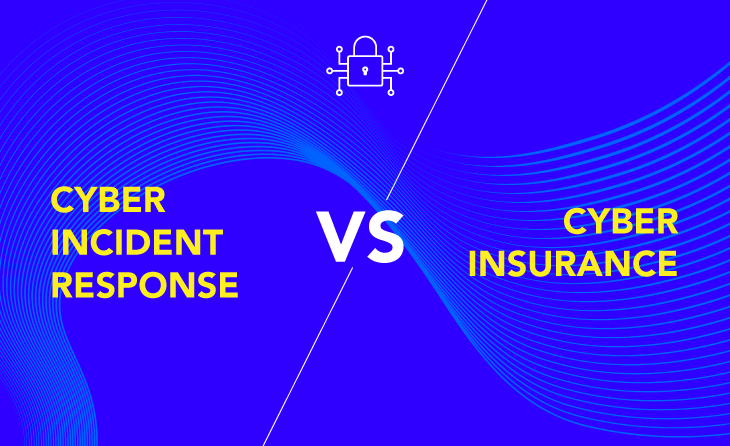
When assessing cyber security strategies, many organisations weigh the pros and cons of incident response retainers and cyber security insurance to find the best fit for their organisation’s specific needs.
However, it’s important to recognise that both elements can be essential components of a comprehensive cyber security plan and that they complement each other in meaningful ways. In this blog post, we’ll explore how incident response retainers and cyber security insurance work together to strengthen your overall cyber security posture.
Understanding Incident Response Retainers and Cyber Insurance
Before we explore how incident response retainers and cyber insurance complement each other, let’s first examine what each one offers.
Incident Response Retainers
A cyber incident response retainer involves engaging the services of a dedicated team of cyber security experts who are readily available to respond to and mitigate the impacts of cyber incidents.
With a cyber incident response retainer in place, organisations gain guaranteed access to rapid incident response capabilities, forensic analysis to determine the extent of the incident, containment strategies to prevent further damage, eradication of the threat, and the recovery and restoration of compromised systems. This proactive approach minimises downtime, reduces financial losses, and helps maintain stakeholder trust.
Cyber Insurance
In contrast, cyber security insurance offers financial protection against the aftermath of cyber incidents such as data breaches or system disruptions. This coverage typically includes costs related to recovery, including legal fees, fines, and customer compensation. While insurance doesn’t prevent attacks, it helps manage the financial impact and supports recovery efforts once an incident occurs.
How Incident Response Retainers and Cyber Insurance Work Together
1. Reactive vs Proactive
By taking a proactive stance, cyber incident response retainers focus on the immediate response, ensuring you have a team ready to act swiftly in the face of an incident. This greatly reduces the potential impact of a breach on your operations, reputation and recovery. They not only handle the investigation and recovery but also help implement security controls from the start, to better secure your organisation. This shortens the period of disruption and pays dividends in maintaining customer and market trust.
On the other hand, by taking a reactive approach, cyber insurance provides financial protection against losses resulting from an incident, covering expenses such as legal fees, notification costs, and loss of income. By having both in place, you ensure that you are both financially and operationally prepared, and therefore in the strongest position to weather the breach.
2. Cost Management
Insurance helps with the financial repercussions of an incident in the aftermath, and a retainer helps manage and reduce costs during an incident. A pre-arranged retainer can help avoid the higher costs of emergency services and minimise the depth and duration of the business impact. Effective incident management can also reduce the overall claim size, potentially lowering your insurance Additionally, having an incident response plan in place can help you secure cyber insurance and obtain the best policies and premiums from the start.
3. Incident Response Efficiency
A well-established incident response plan ensures a rapid response and access to the experts when you need it the most, reducing the duration and severity of an incident. This efficiency can lower costs and damage. To rely solely on cyber insurance to help with the incident recovery itself, could prolong the recovery period, as the speed and effectiveness of recovery efforts may depend on external factors. During this time, the insurance company evaluates whether they will underwrite the cost of the incident. In the best cases, the decision is made within three working days.
4. Regulatory Compliance
Many regulatory frameworks require businesses to have a response plan for handling cyber incidents. Incident response retainers ensure compliance by providing a structured approach to managing incidents. Cyber insurance policies also have compliance requirements, and having a retainer helps meet these requirements and maintain valid coverage.
5. Risk Management and Reduction
Incident response retainers contribute to reducing overall risk by addressing vulnerabilities before they are exploited. This proactive approach can lead to fewer incidents and lower costs, benefiting both you and your insurance provider. Having cyber security insurance helps to mitigate the financial risk of cyber threats and may be important to investors and other stakeholders as part of your risk management practices.
6. Comprehensive Support
While cyber security insurance offers financial relief, incident response retainers ensure that you have the expertise and resources needed to handle an incident effectively. This combined approach enhances overall cyber security resilience and preparedness with both providing important avenues of support in different capacities.
Promoting Peace of Mind
In summary, cyber security insurance and incident response retainers work well together, providing complementary support to the business that mitigates financial losses, and ensures a swift and effective response to incidents that supports both immediate and long-term business continuity. With this approach, you can build a more resilient cyber security strategy that addresses both the operational and financial aspects of cyber risk management.
Contact us today to discuss your cyber security needs and explore how our comprehensive solutions can help protect your data and provide you with peace of mind.